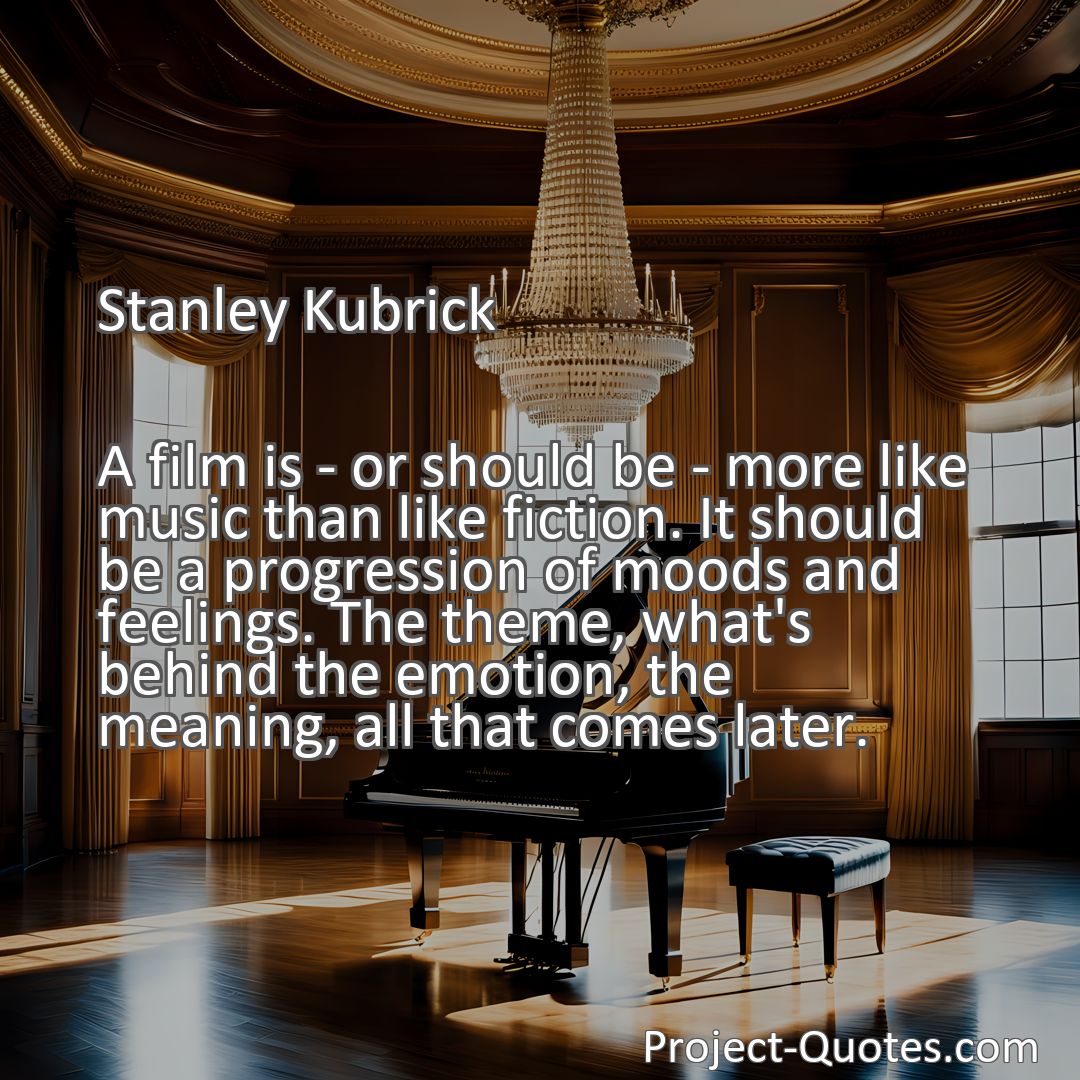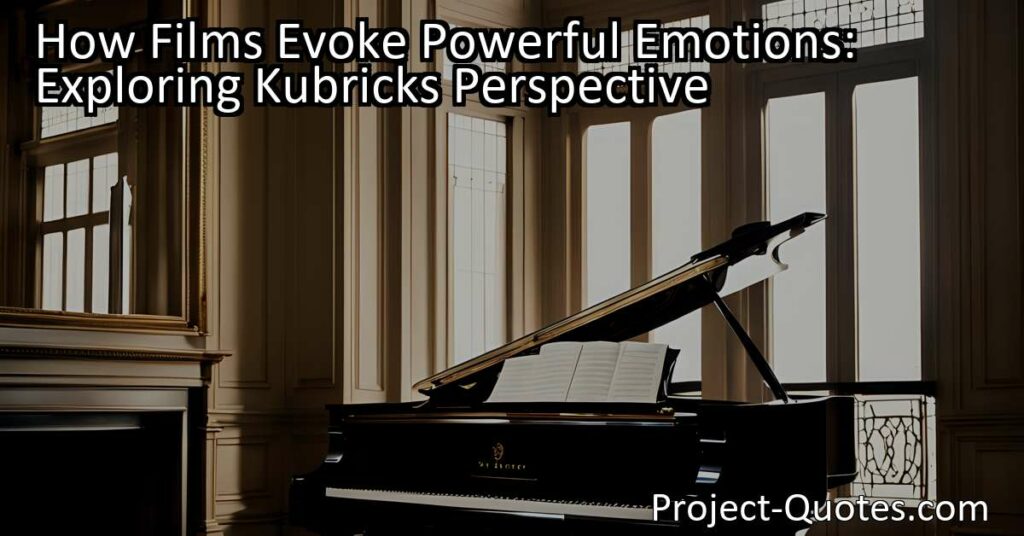A film is – or should be – more like music than like fiction. It should be a progression of moods and feelings. The theme, what’s behind the emotion, the meaning, all that comes later.
Stanley Kubrick
Experience Powerful Emotions with Films: Exploring Kubrick’s Perspective. Discover how movies, like music, evoke feelings and connect us on a deeper level. Let emotions guide your cinematic journey.
Table of Contents
- 1 A film is – or should be – more like music than like fiction. It should be a progression of moods and feelings. The theme, what’s behind the emotion, the meaning, all that comes later.
- 2 Stanley Kubrick
- 3 Meaning of Quote – A film is – or should be – more like music than like fiction. It should be a progression of moods and feelings. The theme, what’s behind the emotion, the meaning, all that comes later.
- 4 Freely Shareable Quote Image
- 5 Related
Meaning of Quote – A film is – or should be – more like music than like fiction. It should be a progression of moods and feelings. The theme, what’s behind the emotion, the meaning, all that comes later.
Have you ever wondered why films have such a powerful impact on our emotions? Well, according to the brilliant filmmaker Stanley Kubrick, a film is more akin to music than fiction. In other words, the essence of a film lies in its ability to evoke various moods and feelings rather than solely focusing on its storyline. This thought-provoking concept suggests that the theme and deeper meaning of a film should emerge naturally from its emotional progression. Let’s delve deeper into this idea and explore how Kubrick’s perspective sheds light on the incredible power of movies to capture our hearts and minds.
To fully appreciate Kubrick’s viewpoint, let’s first grasp the idea of films being similar to music. Just as a beautiful symphony can evoke a range of emotions, from joy to sadness, films have the potential to transport us into a world where our emotions are stirred in a similar way. When watching a film, we become immersed in its visual and auditory elements, much like listening to a captivating melody. The combination of carefully crafted visuals, compelling performances, and a well-chosen soundtrack all contribute to creating an emotional experience that resonates deeply within us.
Unlike fiction, which often places a heavy emphasis on plot and character development, Kubrick suggests that the emotional journey should take precedence over everything else. Just as music can enchant us without relying on words or a particular narrative, so too can a film make us feel something powerful without relying heavily on a complex storyline. Instead, it is the ebb and flow of emotions that guides us through the film, allowing us to connect with the characters and their experiences on a more profound level.
Consider for a moment the opening sequence of one of Kubrick’s most renowned films, “2001: A Space Odyssey.” The film begins with an awe-inspiring portrayal of the dawn of man, accompanied by the timeless melody of Richard Strauss’ “Thus Spoke Zarathustra.” Without any dialogue or substantial plot development, Kubrick manages to convey a sense of wonder and curiosity. It is the sheer emotional impact of these visuals, sound, and pacing that captures our attention and draws us into the story.
As the film progresses, the thematic elements and deeper meanings begin to emerge organically from our emotional engagement. Kubrick believes that by prioritizing emotional progression, a film can guide us to introspection and contemplation without explicitly telling us what to think. This approach allows each viewer to interpret the film’s themes in their own unique way, fostering a more personal and intimate connection with the story.
Take, for example, Kubrick’s masterpiece “A Clockwork Orange.” The film delves into themes of free will, morality, and the nature of evil. However, instead of presenting a straightforward narrative, Kubrick immerses us in the unsettling world of the protagonist, Alex. Through vivid imagery, striking performances, and a haunting musical score, we are confronted with a gamut of conflicting emotions. By experiencing this emotional rollercoaster, we are compelled to ponder the complexities of human nature and society’s role in shaping individuals.
Kubrick’s belief that the emotional journey takes precedence over the theme aligns with the notion that art is subjective and open to interpretation. Just as music can touch our souls in different ways, a film’s emotional progression allows us to connect with it on a personal level, even if our interpretations may differ. This inherent subjectivity is what makes art so powerful and allows it to resonate with people across cultures and generations.
In many ways, Kubrick’s approach can be understood as a departure from traditional storytelling conventions. While the structured narrative is often lauded for its clarity and coherence, Kubrick challenges us to embrace the ambiguity and complexity of our emotions. By prioritizing the emotional journey, he encourages us to explore a more nuanced understanding of human experiences and the world around us.
Moreover, the concept of a film as a progression of moods and feelings speaks to the collaborative nature of filmmaking. Just as a symphony requires the harmonious blend of various instruments, a film relies on the combined efforts of directors, actors, cinematographers, composers, and countless others. Each contribution adds a layer to the emotional landscape, enhancing our overall experience. From the mesmerizing visual compositions to the subtle nuances in the performances, every element further amplifies the emotional impact of the film.
In conclusion, Stanley Kubrick’s astute observation that a film is more akin to music than fiction challenges our conventional understanding of storytelling. By emphasizing the progression of moods and feelings over the intricacies of plot, Kubrick invites us to engage with films on a deeper emotional level. Through this emotional journey, the themes and meaning of a film reveal themselves organically, creating a profound and personal connection to the story. Just as a symphony can stir our emotions without relying on words, a film has the power to transport us through its visual and auditory elements, forging a lasting impact. So, the next time you watch a film, allow yourself to surrender to its emotional progression, and let the themes and deeper meaning unfold naturally. You might just discover a whole new way to embrace the magic of cinema.
I hope this quote inspired image brings you hope and peace. Share it with someone who needs it today!


